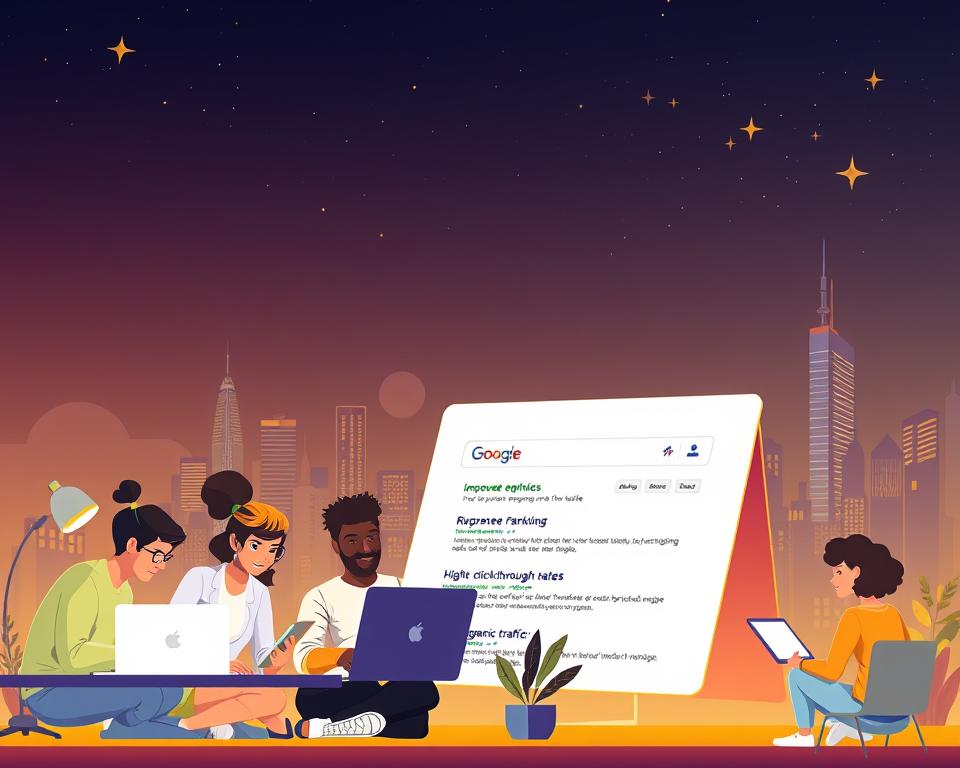Improve Your Company’s Search Rankings using a Established SEO Firm Today
Were you aware that 93% of online experiences begin with a search? This figure illustrates the importance of digital presence for organizations. Partnering with a trusted SEO agency can substantially raise your rankings and drive site visits. Given the fast pace of digital developments, including AI and new search engines like Perplexity, staying up‑to‑date is essential. A dependable digital marketing partner can guide you through these SEO agency obstacles, developing tactics that strengthen your digital footprint and generate extra visitors.
Key Highlights
- Ninety‑three percent of web sessions start via search.
- Reliable SEO firms improve web presence.
- Effective strategies drive traffic to your website.
- Keeping up with SEO developments is essential.
- AI advancements shape the future of digital marketing.
- Select the right marketing partner for your goals.
The Value of SEO
Search engine optimization is a vital part of any robust online marketing strategy. It profoundly affects a business’s presence in search engine results. The importance of SEO is huge, as it enhances website visibility and drives organic traffic. By prioritizing SEO, companies can see a substantial rise in site traffic and conversion rates.
Amid the cut‑throat online marketing arena, neglecting SEO can leave businesses behind. Those that use robust SEO strategies often outperform their competitors. Data reveals that ROI of up to 20% can result from robust SEO investment. This figure underlines SEO’s value in improving search engine rankings and its part in business growth.
Choosing a Reliable SEO Partner
Selecting the ideal SEO partner is a critical decision that affects your business’s outcomes. A excellent SEO agency demonstrates proficiency and trustworthiness through several key indicators. These include a proven track record in various SEO services, a portfolio of case studies, and glowing client testimonials.

Effective communication is a sign of a esteemed agency. Businesses should look for agencies that invest in understanding their unique goals. This understanding permits the creation of customized plans that fulfill specific market demands. Such bespoke methods often produce superior outcomes in SERP positions and digital presence.
Agencies with a strong reputation in the field hire experienced SEO consultants. These experts keep current on the latest trends and algorithm changes. Their knowledge ensures ongoing strategy refinement, leading to lasting results. Working with such professionals can dramatically boost your online visibility.
Digital Marketing vs. Traditional Marketing
Businesses often compare offline marketing with the emerging digital marketing strategies. Offline tactics, like newspaper ads and TV commercials, have been around for years. Yet, they lack interaction and measurability. SEO transforms the landscape, allowing brands to reach their customers more precisely and cost‑effectively.
Digital marketing, powered by SEO agencies, offers a data‑driven approach that exceeds traditional methods in ROI. Offline ads may generate visibility but don’t provide definitive measurements for success. SEO, on the other hand, delivers measurable outcomes. Companies can monitor website traffic, CVR, and overall performance, showing the tangible advantages of digital marketing.
Case studies illustrate the advantages of switching from traditional marketing to SEO. Businesses that adopted SEO experienced improved online presence, increased customer engagement, and boosted revenue. This underlines the risks of sticking with old marketing tactics in today’s digital world.
Why SEO Agencies Matter
An competent digital marketing agency understands the vital function of an SEO agency in achieving online success. These agencies specialize in improving a company’s web visibility through tailored approaches. A key aspect of their work is performing detailed search term analysis, which is crucial for a solid SEO strategy.
SEO offerings go past basic tweaks. They include on‑site SEO, creating high‑quality content, and earning backlinks. This comprehensive approach helps companies connect with their target audience, increasing user interaction and leads.
In today’s challenging market, the value of an SEO agency grows. They not only enhance search positions but also coordinate efforts across different digital platforms. By combining SEO with SMO and paid search, an SEO agency enhances overall brand visibility.
Tailored SEO Plans
In today’s digital world, tailored SEO approaches are vital for businesses aiming to improve their web visibility. Understanding specific needs and analyzing target audiences is essential. This allows companies to craft effective SEO solutions that meet their objectives.
Effective agencies adopt a personalized marketing methodology. They ensure plans align with customer behaviors and search intent. By identifying key search terms and producing custom content, companies can better connect with their audience. This results in a significant edge in drawing and keeping customers.
Adapting to market shifts is vital for companies. Regular updates and refinements help remain current and meet user needs. Organizations that personalize their plans experience better results and increased interaction.
Common SEO Services Provided by Agencies
SEO agencies provide a wide range of services to enhance web visibility and search performance. Keyword research is a core offering, identifying terms that draw customers. It lays the groundwork for on‑site SEO, ensuring meta tags, headers, and site structure match SEO best practices and intent.
Backlink acquisition is also essential for SEO success. Quality backlinks help build a site’s authority. A strategic link‑building approach can significantly boost search performance and grow unpaid visits.
Content creation is vital in an SEO strategy. On‑topic content attracts visitors and retains them interested, improving metrics that algorithms reward. Agencies produce content that resonates with audiences, enhancing the user experience.
Local SEO is another key service. It optimizes a business’s online presence for nearby searches, making it easier for nearby customers to find the company. Together, these offerings create a robust SEO strategy that attracts visitors, improves exposure, and fosters interaction.
SEO Agency Impact
Partnering with an SEO agency can dramatically boost your digital presence. Many companies overlook the transformative power of a well‑crafted SEO plan. An SEO agency uses advanced techniques to enhance your search rankings. This, in turn, raises your exposure across multiple platforms.
This increased exposure leads to a substantial rise in site visits. As additional users discover your company, your online presence grows exponentally. This is a direct result of the agency’s efforts to optimize your content and terms.
SEO agencies go beyond just driving traffic. They conduct in‑depth market research to understand your market rivals and spot opportunities. This knowledge enables them to tailor your content to meet audience needs precisely. By focusing on the right keywords and producing high‑quality content, they build your brand’s authority. This fosters confidence with your clients, solidifying your standing in the market.
Investing in professional SEO offerings does more than merely attract visitors. It fosters genuine connections with your audience, leading to loyalty and return visits. The right SEO strategy not only enhances your online presence but also makes sure your brand shines in a crowded marketplace.
Selecting the Right SEO Agency for Your Needs
Selecting the right %anchor2% is a complex process that demands careful consideration. Begin by conducting an SEO needs assessment. This involves outlining your objectives, budget limits, and communication preferences. This initial step aids simplify the selection process.
Seek an optimal SEO partner who can provide tailored strategies that address your requirements. A proactive agency will provide a detailed analysis of your current online presence. They will then create custom suggestions. It’s essential to ensure the agency has a proven track record and sector expertise.
Examining case studies or testimonials from previous clients is crucial. This information shows the agency’s capacity to deliver results. Partnering with agencies that have expertise in your sector can greatly enhance your outcomes. By adhering to these steps, you can find an SEO agency that aligns with your goals and fuels your online growth.
Wrapping It Up
In the competitive online marketing world, trusting your SEO partner is key for sustained success. Partnering with a trusted firm like Marketing1on1.com allows businesses to execute tailored strategies. These strategies improve search engine rankings and enhance online visibility. This investment in SEO is more than just an expense; it’s a pledge to expanding your business and attracting the right audience.
Recognizing that SEO needs ongoing assessment and adjustment is essential for long‑term performance. As the digital landscape evolves, ongoing optimization keeps businesses ahead. Regularly updating your SEO methods allows you to capitalize on emerging trends and stay at the forefront of your sector.
Embracing SEO as a core component of your overall strategy can greatly influence your growth. By prioritizing SEO, businesses achieve not only short‑term gains but also sustained advantages. These advantages contribute significantly to their success in the online marketplace.








